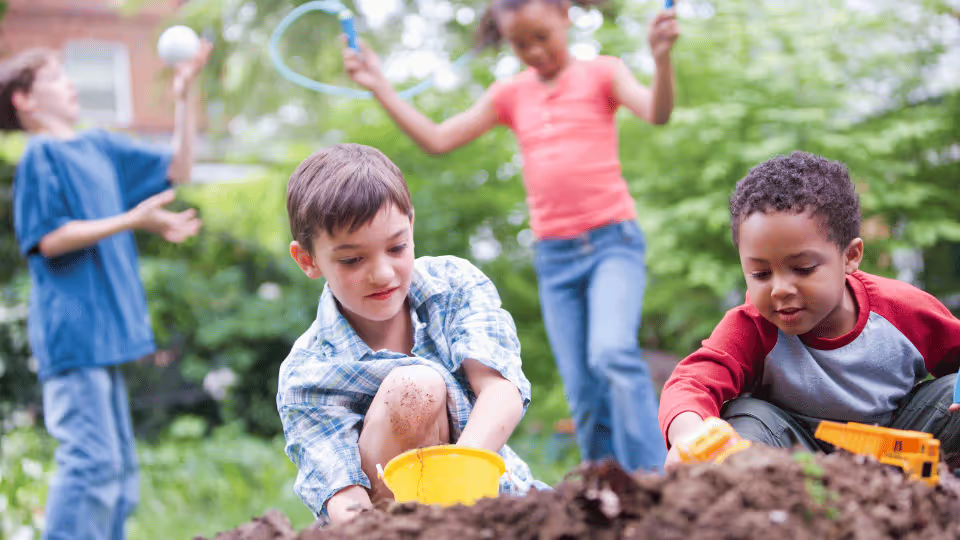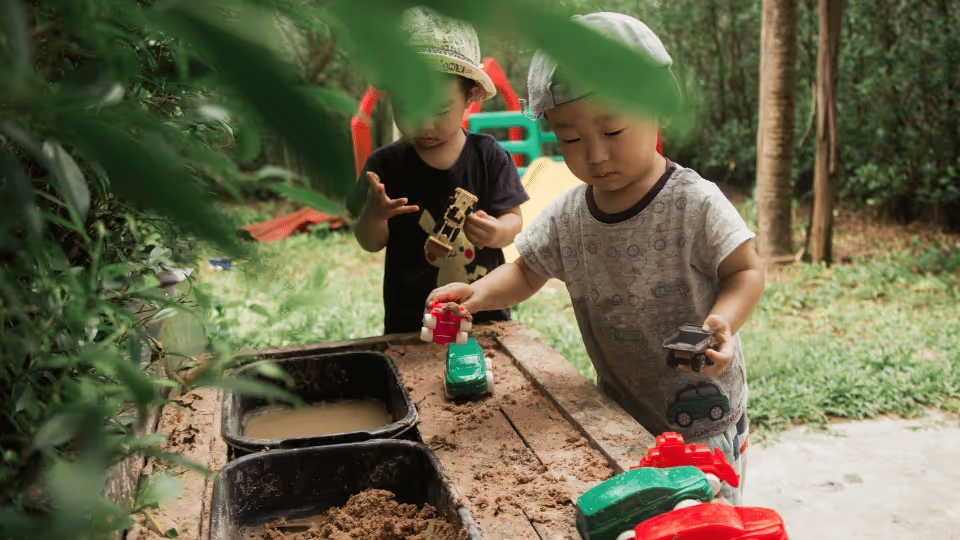
Coral Care content is reviewed and approved by our clinical professionals so you you know you're getting verified advice.
Find effective support for developmental delays, quickly.



Concerned about your child's development?
Our free screener offers guidance and connects you with the right providers to support your child's journey.
Looking for ways to turn therapy into playtime during summer vacation? Your backyard is the perfect place to support your child’s physical and occupational therapy goals. From balance games to sensory-friendly adventures, these creative outdoor activities are designed to strengthen motor skills, improve coordination, and support sensory development, all while keeping kids active, happy, and engaged.
Key Takeaways
- Outdoor play is critical for pediatric therapy as it enhances motor development, sensory processing, and social skills through varied activities.
- Creative backyard games can support both physical and occupational therapy goals by improving gross and fine motor skills, coordination, and executive functioning.
- Adapting activities to each child’s unique needs, ensuring safety, and involving therapists when necessary can optimize the benefits of outdoor play for therapy.
- Support your child this summer (and every season!) with Coral Care’s comprehensive developmental therapy services. Book a consultation today for expert care in pediatric physical, speech, and occupational therapy within two weeks or less.
Why Outdoor Play is Essential for Well-Rounded Physical Therapy

Playing outside is more than just fun; it’s central to physical therapy goals for children of all ages. Varied terrains found outdoors challenge children to balance and plan movements, essential for motor development. Fresh air and sunshine boost mood and energy, enhancing motivation and engagement in therapy and beyond.
The natural environment is perfect for sensory integration; different textures, sounds, and smells enhance sensory processing skills, while outdoor play fosters creativity, independence, and decision-making, aiding in problem-solving skill development.
In addition, active outdoor play helps build strength, supports cardiovascular health, and encourages kids to spend less time on screens—creating more opportunities for social interaction and physical activity. It’s a fun and functional way to support overall development.
Key Therapy Goals Supported by Outdoor Activities

Outdoor activities are a powerful way to support a wide range of pediatric physical and occupational therapy goals. Gross motor development is significantly enhanced through dynamic movements like running, jumping, climbing, and balancing—fun yet vital actions that strengthen muscles and improve coordination.
Fine motor skills, which involve precise hand movements and object manipulation, can also be developed outdoors. Activities like gripping tools, drawing with sidewalk chalk, or using garden equipment help refine hand strength and control in engaging, practical ways.
Sensory processing naturally improves when children interact with a variety of outdoor stimuli—such as textured surfaces, natural sounds, and fresh scents. Activities that involve proprioceptive (body awareness) and vestibular (balance) input are especially beneficial for brain development and regulation.
Outdoor recreation further supports body awareness, coordination, and physical endurance across all ages. Simple, structured games in the backyard or at the park provide opportunities to practice movement, posture, and control in a low-pressure, enjoyable setting.
In addition to physical benefits, getting friends together for group play outdoors nurtures social-emotional development; children are able to practice teamwork, patience, turn-taking, and resilience through play. Outdoor activities also help build executive functioning skills like planning, following directions, problem-solving, and adapting to changing rules—making outdoor time both fun and critical for skill development.
Transform Your Backyard Into a Therapy-Focused Play Zone
DIY Obstacle Course
Use household items like cones, hula hoops, jump ropes, or pool noodles to set up a simple obstacle course.
- Have your child crawl under ropes, hop through hoops, and weave around cones.
- Encourage climbing over safe, low structures (like cushions or low benches).
This builds strength, coordination, and motor planning.
Backyard Balance Challenges
Lay a garden hose or a plank of wood on the ground to create a balance beam.
- Let your child walk slowly across it, arms out for balance.
- Add challenges like balancing while holding a small object.
This improves stability, core strength, and proprioception.
Ball Games
Grab soft balls or beanbags for catching, throwing at targets (like buckets), or kicking to a partner.
- You can also set up a simple bowling game using plastic bottles.
These games boost hand-eye coordination, muscle strength, and timing.
Nature Scavenger Hunt
Create a list of items to find in your yard—like a smooth rock, yellow flower, or pinecone.
- Kids bend, stretch, and reach to find each object.
- Encourage using tongs or clothespins to pick things up for fine motor practice.
This encourages flexibility, body movement, and fine motor control.
Chalk Hopscotch & Sensory Paths
Draw a hopscotch grid or a sensory path with chalk—include arrows, footprints, zigzags, or shapes.
- Have your child hop, skip, tiptoe, or spin along the path.
This supports balance, coordination, and visual-motor integration.
Core-Building Animal Walks
Try silly movement races like crab walks or wheelbarrow walking (with adult support).
- Set up short paths and time each round to make it fun.
These improve core strength, upper body coordination, and endurance.
Bubble Chasing
Blow bubbles and have your child run, reach, and pop them in the air.
- Try having them pop with different body parts—feet, elbows, or knees—for added fun.
This encourages running, reaching, and visual tracking.
End with a Walk
Wrap up with a short nature walk around the yard or neighborhood.
- Bring along a favorite toy or turn it into a treasure-hunt walk. Walking helps improve endurance, leg strength, and sensory regulation.
Outdoor Sensory Play Ideas for Occupational Therapy

Sensory play takes on a new dimension outdoors! Mud kitchens or sand/water tables are perfect for tactile exploration and fine motor development, and DIY texture walks with pathways made of grass, rocks, sand, or foam stimulate the feet and provide varied sensory experiences.
Painting with nature while using sticks, leaves, or rocks as brushes allows children to express creativity and explore textural landscapes while developing grip strength. Drawing with colorful sidewalk chalk strengthens both hand muscles and visual-motor skills while also practicing balance.
Gardening activities encourage motions like scooping, pouring, digging, and planting. It also engages children in functional hand use and teaches them about plant life cycles. Swinging or relaxing in a hammock provides vestibular input and calming proprioceptive stimulation, ideal for building sensory processing skills.
Building DIY sensory bins is another exciting activity, and when filled with rice, beans, or water beads can be set up indoors or outdoors for tactile exploration.
Tips for Adapting Activities to Your Child’s Needs
Every child is unique, and so are their developmental needs. To make activities more accessible and enjoyable, it's important to modify tasks based on each child’s developmental level—this might mean shortening steps or simplifying instructions. For children who benefit from structure, visual aids like picture schedules can be especially helpful in guiding them through tasks.
Providing adaptive tools, such as larger handles or specialized scissors, can support children facing fine motor challenges and help them participate more comfortably. Breaking tasks into smaller, manageable parts—with frequent breaks—helps maintain engagement and reduces frustration. Offering choices throughout the activity also gives children a sense of control, which can boost motivation.
Positive reinforcement and celebrating small successes build confidence and encourage ongoing participation. Adding a social element—like involving siblings or peers—can make activities even more enjoyable and meaningful. Ultimately, children are more likely to engage when they feel supported, capable, and understood.
Backyard Safety Tips
Outdoor play is a wonderful way for children to explore, grow, and enjoy the fresh air—especially as summer begins. To keep these experiences safe and fun, always supervise children closely, particularly around water or climbing equipment. Make sure the play area has even ground and is free from potential hazards like sharp objects or slippery spots.
Choose cooler times of the day for outdoor play, and help kids stay hydrated and sun-safe with plenty of water, sunscreen, and shade. These simple steps can go a long way in preventing heat-related issues.
If your child has specific medical or developmental needs, consider checking in with their physical or occupational therapist before introducing new activities. Therapists can help adapt your backyard setup to support your child’s goals while ensuring playtime stays safe and engaging.
And don’t forget to keep a first-aid kit handy—it’s always a smart move during active play, just in case.
Turning Play into Progress
Backyard play is more than just fun; it’s a valuable way to support your child’s development. With consistency and a bit of creativity, everyday outdoor activities can reinforce therapy goals and promote meaningful progress. Outdoor play encourages independence, builds confidence, and helps children develop real-world skills during the warm, summer season.
By incorporating imaginative games and sensory experiences tailored to your child’s needs, you can turn your backyard into a powerful and engaging extension of therapy. The great outdoors offers endless opportunities for growth—so step outside and let playtime become a path to progress.
Frequently Asked Questions
To effectively adapt outdoor activities for your child, modify tasks based on their developmental levels, utilize visuals for better understanding, and break activities into smaller, manageable parts. Engaging them with choices and positive reinforcement can also enhance their experience.
Engaging in sensory play activities like mud kitchens, texture walks, and DIY sensory bins can effectively support occupational therapy goals by promoting fine motor skills and sensory integration. Incorporating such activities into therapy sessions can enhance the therapeutic experience and improve overall outcomes.
Consider incorporating obstacle courses, balance challenges, and nature scavenger hunts as engaging backyard games for physical therapy. These activities promote movement and coordination, making therapy both effective and enjoyable.
Outdoor play is a powerful extension of therapy. When combined with guidance from Coral Care professionals, everyday activities—like backyard games, nature walks, or water play—can be adapted to support motor skills, sensory processing, and emotional development. This real-world practice helps children apply what they’ve learned in therapy in fun, engaging ways, boosting both their confidence and functional independence.
Summer offers a perfect opportunity to keep your child engaged while reinforcing their therapy goals. Coral Care connects you with licensed pediatric therapists who create customized care plans that fit seamlessly into your summer routine. Whether you're at home or on the go, Coral’s expert guidance ensures your child continues to make meaningful progress—even outside of the traditional clinic setting.



.avif)

